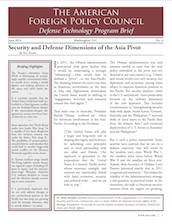On May 14, as part of its ongoing education efforts relating to defense and security, AFPC hosted Dr. Peter Brookes on Capitol Hill for a presentation on the “Security and Defense Dimensions of the Asia Pivot.”
Dr. Brookes is currently a Commissioner on the U.S.-China Economic Security and Review Commission. Previously, he served as Deputy Assistant Secretary of Defense for Asian and Pacific Affairs, on the staff of the House International Relations Committee (now the Foreign Affairs Committee), and in positions at both the CIA and State Department.
In his remarks, Dr. Brookes highlighted concerns that budget constraints may hamper America’s ability to fully fund the strategic pivot to Asia. While China was never the named impetus for the pivot, he noted, the explosive growth of Chinese defense spending, in particular on ballistic missile technology, naval modernization, and asymmetric capabilities in the cyber and space domains, makes Beijing a major focus of strategic planning.
Additionally, continued tensions with North Korea and its young and untested leader, Kim Jong Un, further highlight the strategic importance of the Asia-Pacific.
The potential threats from China and North Korea, Brookes said, underscore the need for increased investments in missile defense technology. These investments should include further development of ship-based interceptors for fleet protection, increased capabilities for space-based tracking of ICBMs and increased regional cooperation among U.S. friends and allies on missile defense.
In this shifting strategic environment, Dr. Brookes argued, intentional vulnerability is no longer a deterrent and may lead to coercion, further proliferation, and actual aggression, making missile defense a critical element of the Asia pivot.

